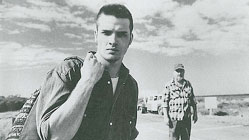|
|
|
|
Broken
Highway
|
 |
|
Broken Highway arrived as one of a group of films touted as a particular kind of wave in Australian cinema. Peter Sainsbury, then Principal Advisor, Film Development, of the Australian Film Commission, spoke in the early '90s of a slate of funded feature projects designed as marketable films rather than commercial blockbusters, i.e. geared to new niche markets within the burgeoning art house exhibition sector. Moreover, the creativity and energy behind these films would be drawn from spaces in Australian cultural life hitherto neglected and made marginal – the enclaves of independent and experimental filmmaking, and intellectual cinema study. The relevant films include Ross Gibson's Dead to the World (1991, unreleased belatedly only to TV), Tracey Moffatt's Bedevil (1993), David Perry's The Refracting Glasses (1993), Solrun Hoass' Aya (1991), John Hughes' documentary One Way Street: Fragments for Walter Benjamin (1992) and Susan Dermody's Breathing Under Water (1992). Unlike these films, Broken Highway is neither highly intellectual nor intensely politically motivated. Writer-director Laurie McInnes had previously directed a highly acclaimed, Cannes award-winning, quasi-experimental short, Palisade (1987). Her intricate, expressive concern with the possibilities of film language is, in Broken Highway, married to a particular form of drama, taking place entirely within the emotional registers of pain, loss, unfinished business, guilt and tormented memory. Yet it is not a melodrama: the proceedings have a hushed air and much of what interrelates and motivates the characters is left unspoken, as in the films of the Bresson-influenced Benoit Jacquot (such as La Désenchantée [1990]). Angel (Aden Young) quits a life at sea and travels to Honeyfield in Queensland, carrying a bag of opium as a gift for the sinister landowner Kidd (Norman Kaye) from his recently deceased acquaintance Max (Dennis Miller). Surrounded by a bunch of crazies who are morosely haunted by their dark past, Angel gravitates especially towards Catherine (Claudia Karvan). In this psychodramatic tangle, each character seems to be the embodiment of someone else's lost mother, father or lover figure. McInnes chooses to thin out this story material, expunging any violent or erotic content that might be deemed vulgar and sensationalist (a reticence shared by all the "experimental features" cited above). It is a film of moody images and atmospheric soundscapes, at times strikingly realised, as in the remarkable scene of a night drive, where an object is glimpsed bursting into flames in the distance. But the dialogue is a problem for the actors, who struggle with such overstated and pseudo-poetic lines as "You smell and your love smells" and "You never seen glory. How can you hope to see a lost soul?" The film has been greatly ridiculed for its qualities of obscurity (it is occasionally literally difficult to see or make out what is happening), emotional coldness and symbolic portentousness. Yet, given that McInnes clearly intended to make such a baroque film on the levels both of style and dramatic content, it is possible to argue that Broken Highway is more of a piece, more coherent in its manner and sustained in its mood, than virtually all of the would-be innovative Australian films already mentioned. (Subsequently, McInnes has completed only one other film, the rather dismal Dogwatch [1999], released solely to video and DVD.) Possibly the most interesting and successful aspect of Broken Highway is the unselfconscious way it filters the Australian landscape through an essentially American sensibility. This tale of Gothic Queensland is basically an Antipodean Rumble Fish (1983), with a barrow-full of themes taken from the Sam Shepard school of modern melodrama (which has found in its local variation in the plays of Daniel Keene, here a script consultant). With these influences come older references: Tennessee Williams, Orson Welles' Touch of Evil (1958), James Dean in East of Eden (1955). The film doesn't know quite what to do with all this baggage, but it at least carries the load with ease and grace. © Adrian Martin December 1994 |
![]()